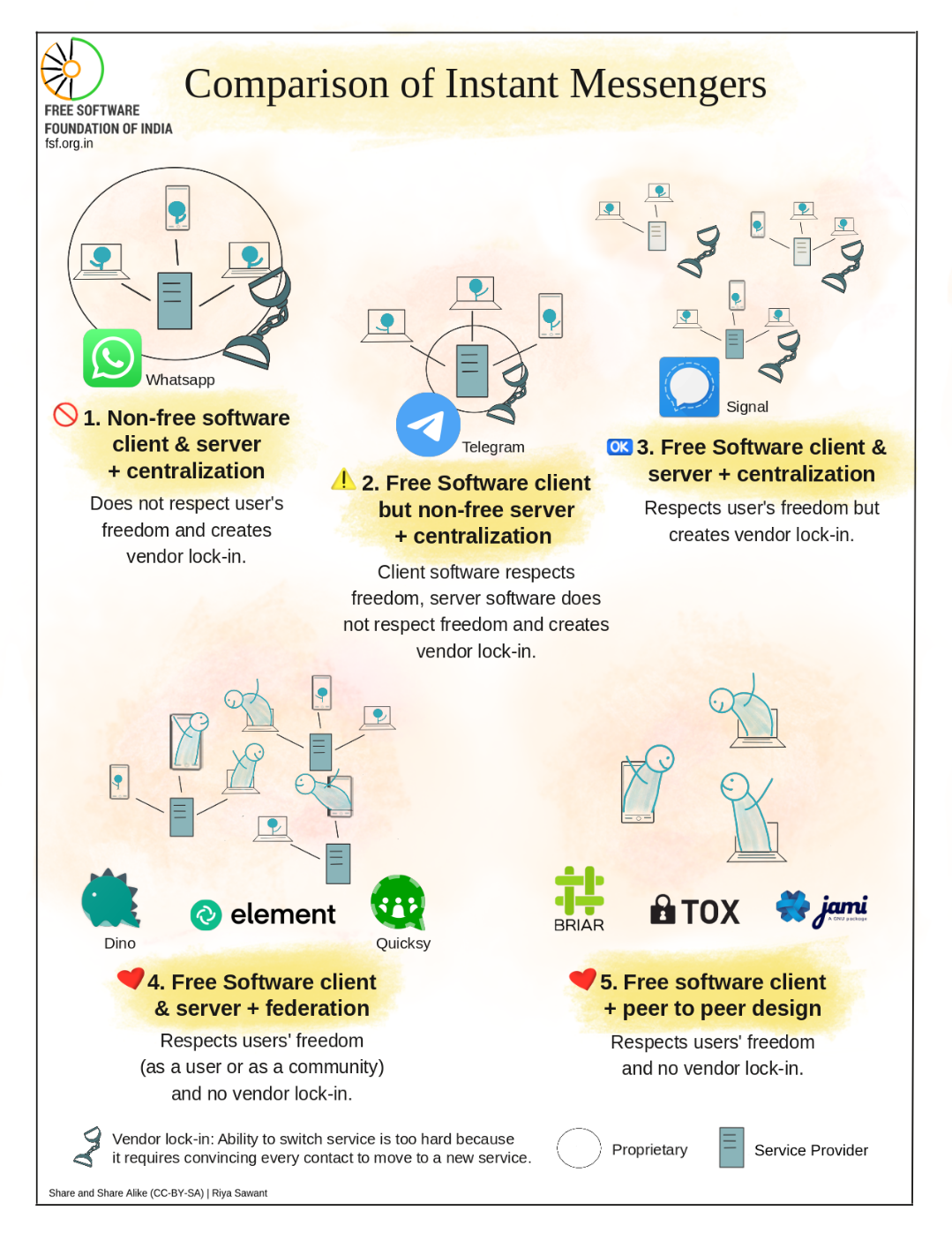I’m leaving WhatsApp tomorrow. Now, the privacy-community on the web features countless discussions, blogs, videos, and comments on whether XMPP or Matrix would be the better protocol, whether people should use Signal or not and why - but I’ve been missing one thing: A simple and short article to send to my friends where the main differences between centralized, federated, and distributed messaging services are outlined.
So I wrote one! I thought it might be useful for others too, so I’m sharing it here. Please feel free to bookmark it and share it with your family and friends!
Link to the article in the geminispace: gemini://gemlog.blue/users/yellow/1612715438.gmi
Notice anything missing? Anything wrong and needs to be fixed? Happy to hear and integrate some feedback! :)
A significant difference between Matrix and XMPP (and many other classical protocols) is an architectural detail. Gladly correct me if I’m wrong here, I’m working on my educated assumptions here based on limited and quick reading of many of these protocols.
XMPP and (say) IRC are message transmission protocols. A payload consists of a message. There’s lots of details on top of this (especially with XMPP and its extensions), but that’s the core idea.
Matrix is a log synchronization protocol. Its purpose essentially is to make sure every patricipant in the network is reaching towards identical state. This is an important difference in terms of reliability, because (barring software bugs of course) it means that being off-line cannot cause any disruption in message flow. But it’s also bit more difficult to implement well.
I assume many other modern messaging applications work like Matrix as well, but I’ve paid even less attention for those.
Ah, you should also mention that DeltaChat uses a federated system — namely email. This provides a very easy on-ramp for lots of people.
However, DeltaChat doesn’t offer voice and video calls — and this is a major disability. The same is true of Session.
Perhaps make a section listing those with voice and/or video call ability.
In the latest release of deltachat they’ve included an interesting workaround which messages the recipient a link to a predetermined jitsi room:). It’s in the advanced settings. I pressume if you also use the jitsi meet app it will open automatically.
Great article, love the graphics too. Very good for beginners.
Thanks a lot! :)
One last note: Conversations (XMPP) isn’t (entirely) free on Google Play Store, I think. But it is free on F-Droid.
Thanks a lot for the feedback! I’ll try to reply to everything at once:
-
I’ve used Zulip in the past, but I think including it here makes it a little bit too messy, since the article mainly focuses on personal instant messaging and not corporate/organisational messaging. Otherwise I should probably include a section on e.g. Rocket.Chat and Mattermost as well, and then it would become very bloated. I think others do a good job of explaining that already! I think I’ll include a link to https://www.how2shout.com/tools/open-source-team-chat-software.html under further reading though so that people searching for such alternatives can find one there.
-
I have some personal reservations about the Lokinet project due to it’s role in political extremist/terrorist radicalisation movements (see https://media.ccc.de/v/36c3-10639-let_s_play_infokrieg#l=eng). And personally I don’t know anyone using Session either. So I will leave it out for now.
-
DeltaChat is a good point. I think covering it in this article risks cluttering it up so that the difference between email and XMPP/Matrix might not be that clear anymore? I believe that it’s covered by the links I have in further reading in any case!
-
And on Conversations: That’s true! I adapted the graphic from niboe.info who used Conversations as an example for a XMPP client. The app though is open source - and that’s what counts. (Signal’s source code is also open, and still it’s offered in the Google Play Store). But then again I also don’t cover clients in depth 🙈
-
As for the section on voice/video call ability: Good idea! I think though that all the messengers that I mentioned provide that functionality, except for Briar and RetroShare? I might mention that and will include a link to this messenger matrix under further reading, so that people who want to do so can read up on the details of the functionality of the different messengers :)
Thanks a lot for your input once again! ^^
All good responses, I only mentioned Zulip because Slack was on a graphic.
I think it’s a mistake to exclude Session — terrorist groups have probably used other networks even more. Especially if you include Briar and Tox. Session is laggy though … but very, very secure … for journalists in totalitarian regimes, for example.
What is used in more in illegal activities: USD or BTC?
DeltaChat doesn’t allow voice/video chat … otherwise it would be almost perfect.
-
Decent write up, you’re missing Session which is similar to Tox and Zulip an open source and self-hosted Slack alternative.
+1 for session, it looks amazing for privacy and anonymity thanks to bouncing the message multiple times and stripping metadata. clean and modern interface as well.




